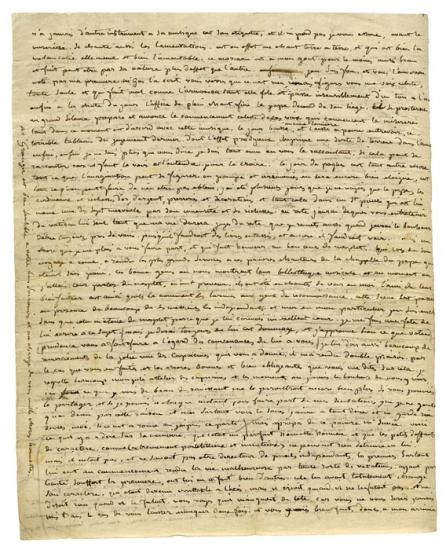
Letter from Ingres to Charles-Pierre-Michel Forestier, 7 April 1807, page 2
Purchased on the Fellows Capital Fund, 1969
Sent to his prospective father-in-law six months after arriving in Rome, this letter indicates that the artist's spirits had improved. Ingres was decidedly entranced by the many masterpieces on public view, such as Michelangelo's Sistine Chapel and "the beautiful paintings of Perugino." He also includes news about recent developments at the French Academy in Rome, notably the sudden death of the director, Joseph Benoît Suveée (1743–1802). Ingres writes of the latter's replacement, Guillaume Lethière, of whom he would later create a masterful portrait: "I really like M. Lethière, and I hope that I will get along with him as well as I did with M. Suvée."
never has other instruments to his music. It's his earmark and he does not lose thereby, I assure you. Before the Miserere the Lamentations are also sung; it is in fact an earthbound song that is the epitome of melancholy and lament. This piece is, to my taste, at least as good and is perhaps by nature more effective than the other; I'm crazy about it and will send it to you annotated by my first. Mr. Gasse wrote it. You will see that it is nothing much, but just imagine a heavenly voice, all alone and that hurts like the harmonica, as it flows and passes imperceptibly from one tone to another. Finally, at nightfall, the plainsong service ended, the Pope descends from his seat, he prostrates himself, a great silence prepares and announces the heavenly beginning of these voices that begin the Miserere. Everything in this moment is in accordance with this music: no lights, daylight fades and just allows a glimpse of that terrible scene of The Last Judgment, whose prodigious effect imprints a sort of terror in the soul. Finally, finally I do not know what else to say; I am deeply moved while telling you, if telling is possible, because you have to see and hear it to believe it. Easter Sunday, it is an entirely different thing. All that the imagination can dream up of pomp and ceremony will still be far from reality, it's all one can do not to be dazzled. For several days I only saw the Pope, the cardinals, the wealth of gold, silver, jewels and decorations and all that in a Saint Peter, that is itself one of the seven wonders by its vastness and its riches. In fact, I will be able to tell you about the Vatican, itself alone, as long as I live. You'll be able to hear the rest, which I also leave out, when I have the happiness to always be near you, since it would take piles of books and more to fill you in. But one thing that I am pleased to let you know about and that honors the good heart of Mesplet: during his trip to Rome he did great kindness to these poor singers of the Pope's Chapel, who were in the greatest need. These good people were showing us their music library, and when I was about to tell them about Mesplet, they forestalled me. They were delighted to see me as the friend of their benefactor, for so they call him with tears of gratitude in their eyes. This scene took place in the presence of many of these independent gentlemen and I, in my own mind, am delighted without it surprising me of Mesplet, because I know his great heart. I look forward to writing him about it, but I always say about him, "It's too bad," and I approve what your prudence made you do in regard to his breach of good manners. I also owe him a lot of thanks for the lovely view of the Capucines that he gave you, he made me doubly pleased because of the value you set on it and the good and considerate things you tell me about it. I miss my beautiful studio at the Capucines and the times when I had the happiness to see you there; here, all I see that is beautiful, delightful, would seem to me much more so if you could share it and if I could at every moment share my feelings with you, which I enjoy only halfway for this reason, and I especially, as you know, like to say everything and keep nothing to myself, except that in Rome I have decided to do just that. But in regard to this poor Mr. Suvée, here is what there is to say in his memory: that he was a perfectly decent gentleman and his small character failings (like great touchiness and meticulousness) cannot be the ruin of him. But he was not, and should not have been Director of such independent [students]. The first ones especially, made life miserable for him in the beginning through all kinds of provocations. Having, through his goodness, suffered the first, he was made to suffer many others. It totally changed his character, which became extremely irritable. But he shouted when he should not have and said nothing when he should have. You can see that he lacked judgment, for you would never have put yourself in the position of being affronted twice, and you would have done well. So, when I arrived,
